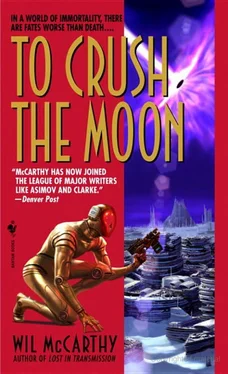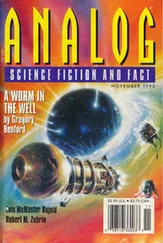In the recorded testimony, Shiao sits very straight in his chair. His expression is placid, as though he finds his own story interesting but not upsetting. The other voice belongs to Hack Friesland, the Kuiper Belt district attorney, not visible in the frame.
“Did you fire back?”
“No, sir. I issued an order that the attackers were to be taken alive at all costs, on account of their distinctive nature. Observing two of them at close range, I noted that beneath the helmet domes their heads were hairless and earless and very pale, with two apelike nostrils taking the place of a normal human nose. Their eyes were gray and somewhat oversized. There is no direct evidence linking this attack with any known group, but these features are typical of suspected Fatalist operatives, who are believed to be disposable copies of the actual organization members, downloaded into physically and genetically identical bodies to baffle our investigators. The popular term for these avatars is ‘ghoul.’”
“We’re aware of the terminology,” says Friesland. “But how did you expect to capture one?”
Shiao’s testimony continues, “The attackers’ weapons were recoilless, sir, but as the projectiles obviously were not, we were forced to rocket ourselves upstream through a hail of them. We did succeed in overpowering nine of the attackers, although under the effects of sustained fire, four troopers and both of my sergeants were disabled. I later learned that they were killed. However, the nine attackers were in fact restrained.”
“But not arrested.”
“No, sir. At this point, a voice on the citizens’ frequency cut in, shouting, ‘All hands abort! Abort!’ And the faces of the attackers I could see fell immediately slack. There is a particular look on a human face, sir, when the animating consciousness behind it is erased. The lights go out, so to speak; there’s nothing ambiguous about it. Later scans showed that these individuals’ brains, skulls, and even their spinal columns and stomach nerves had been subjected to a complete quantum wipe. Similarly, all information in the bricks they carried was summarily destroyed.
“Our sensors can be quite astute, and some small fraction of these data were eventually reconstructed in spite of the attackers’ best efforts. We know, for example, that one of the attackers ate tea cakes on at least one occasion. Unfortunately, very little was uncovered that proved useful to our investigation.”
“I’m sure the physical damage to the evidence didn’t help?”
“An excellent point, sir. With the engagement apparently over, we would have called fresh robots from the fax, shipped the bodies to a Constabulary lab for immediate analysis, and moved in to search the suspect vessel on probable cause. That would be standard procedure. However, the vessel’s fusion reactor initiated a cascade overload, resulting in a kiloton-class explosion which scattered the physical evidence, obliterating some of it beyond hope of reconstruction. Newhope itself had grown the proper shielding, and was minimally damaged. I did not know any of this at the time, but I suspected it, as my helmet dome went superreflective and I was aware of a sharp physical impulse, very much like striking the ground after a fall. I felt my body tumbling, and when it was recovered six hours later, the autopsy revealed I had died shortly thereafter, from a combination of blunt trauma and gamma ionization. I recommended myself for disciplinary action, sir, but was refused.”
“That’s in the record, yes. Do you have any regrets about the encounter?”
“Many. Most notably, the skeletal figure was not apprehended during the scuffle, and no trace of it could be found afterward. This, too, is typical of our encounters with presumed Fatalists. We have yet to develop an effective tactic for arresting them.”
When asked what he did with the Medal of Conduct he’d won for his heroism, Captain Shiao replied, “It’s against regulations, sir, to wear such adornments on duty, or to wear them at any time on a garment other than a Constabulary uniform. There is one that I sometimes bring with me to state functions; this particular medal I placed in a locker with the others for safekeeping. It’s a great honor to serve the Queendom in this way, for the Fatalists are breaking the law . The awards themselves are of secondary importance.”
And when asked if he expected to die himself someday, Shiao frowned in thought before answering, “Permanently? Irretrievably? That would be a gross dereliction of my duties, sir. Unless a qualified replacement were found ahead of time, I should do my best to remain alive. However, if it happened that my services were no longer required, I suppose I’d consider terminating my life voluntarily, as an act of community.”
In response to this remark, Shiao’s wife Vivian, the beloved Director of the Constabulary, is reported to have offered a colorful rebuttal which history, alas, does not record.
Chapter Five
in which innocents are imperiled
The doctor, Angela Proud Rumson, turned out to be only the first of a tag team of nonthreatening female civil servants paraded through Conrad’s room. There was P.J. the environmental technician—who thoughtfully interrogated him about the conditions of his “native” Planet Two. Was the light too bright for him here? Would he prefer a chlorine atmosphere?
“It was called ‘Sorrow,’” Conrad told her, “and I wasn’t born there. I’m from Ireland, originally.”
“Oh, how nice,” she said, sounding surprised.
“It wasn’t that much dimmer than Earth, just… yellower. And the chlorine was never more than a trace gas.”
Again, surprise. “Fatal concentrations, I thought.”
He shrugged. “To a regular human lung, sure, but it’s a minor biomod. I barely noticed it after the first couple years. The biggest difference between P2 and Earth is the length of the day; P2’s is a lot longer. And that’s not something a sane person would miss.”
And when P.J. was gone there was Lilly the nurse, and then Anne Inclose Ytterba, who was apparently some sort of famous historian.
“You want to know about life in the colonies?” he asked.
“Very much so,” she said, “but I’ve been asked to hold that conversation for another time. Right now I’m here to brief you on the past thousand years.”
Which turned out to be a really short conversation; the population of Sol had quadrupled, and nine of the thirteen colonies had gone offline and were presumed extinct. Nothing else of any real import had happened.
“We lost contact with Barnard in Q987—three hundred and three years ago. The circumstances were curious; there had been talk of a budget crisis, and then a cemetery crisis. No details were offered, and in your King Bascal’s final announcement no mention was made of them. The next message—the colony’s last—was from something called the ‘Swivel Committee for Home Justice’ announcing that King Bascal had abdicated his throne, and that the Instelnet transceivers were being temporarily shut down to conserve energy. This occurred on schedule, and no further transmissions have been received from Barnard since that time.”
“So they might still be alive?” Conrad asked, reeling under the news. He’d been born into a world without death, and the grim toll of life on Sorrow had never seemed normal to him. It was, fundamentally, the reason he’d braved the rubble-strewn starlanes once again: to bring thousands of children to a place where “dead” was a medical condition rather than the end of a universe.
“They might,” she agreed, “although the so-called budget crisis was really more of a food crisis. The population had just passed the one million mark, but the fax economy was declining asymptotically to zero, and agricultural production had not fully taken up the slack. Think of it as an energy shortage, if you prefer; insufficient conversion of sunlight into food.”
Читать дальше












